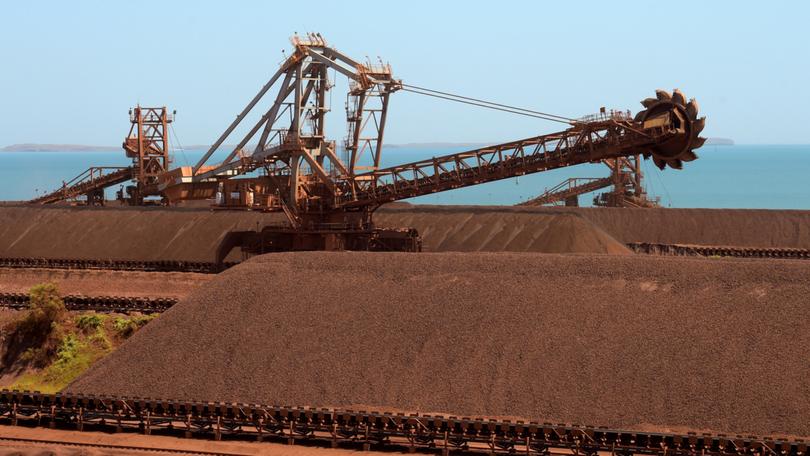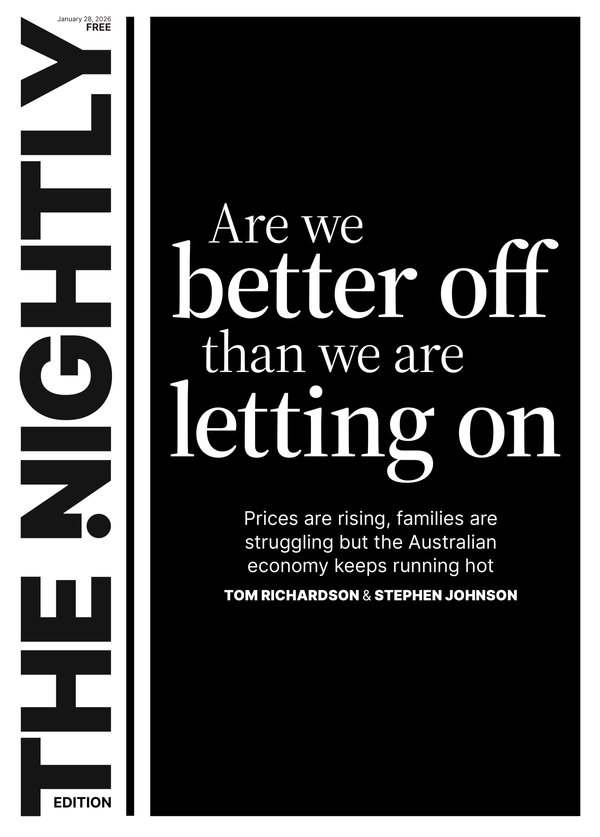Progress review on Rio Tinto’s workplace culture report shows room for improvement, says miner’s leader

A review of global miner Rio Tinto’s workplace culture has found instances of sexual assault and harassment, bullying and racism either has not improved or got worse in the past two years.
Eight actual or attempted sexual assaults were recorded in the past year and 40 per cent of review participants witnessed bullying, sexual harassment or racism in the past 12 months.
The progress review follows the miner’s damning Everyday Respect report by former Australian Sex Discrimination Commissioner Elizabeth Broderick in the wake of a landmark WA parliamentary inquiry into cultural issues in the sector in 2021.
Sign up to The Nightly's newsletters.
Get the first look at the digital newspaper, curated daily stories and breaking headlines delivered to your inbox.
By continuing you agree to our Terms and Privacy Policy.While reported instances hadn’t got better or got worse, half of workers said their perception that issues were improving had increased.
Chief executive Jakob Stausholm admitted while progress was evident in the review, there was still a long way to go to change culture.
“It is a long-term journey. People are still experiencing behaviours and attitudes in our company that are unacceptable and harmful,” Mr Stausholm said.
“I am greatly troubled by this and sincerely apologise on behalf of our leadership team to anyone affected.
“We’ll stay the course. We will continue working on strengthening the diversity and the inclusiveness in our culture.”
Out of 26 recommendations from Ms Broderick’s review, 17 have been implemented in the two years since the release of the report.
Ms Broderick described the findings of the progress review as a “lagging indicator”, saying initiatives implemented in 2022 were still yet to trickle through in survey responses.
She said change was a long-term process which “unfolds in a non-linear fashion”.
The progress review found fear of speaking up remained an ongoing issue, with only 13 per cent of those who experienced sexual harassment filing a report and just a third of bullying victims filed a report — results which echoed the finding in the first survey.
One worker labelled it “career suicide to report”.
“You keep your mouth shut. If you report nothing gets done, there is no guarantee that it is not career suicide. The only way that you can get somewhere is to have someone to back you up,” they said.
Most sexual harassment incidents involved direct peers and women were the most likely target.
Requests for sex or sexual acts and intrusive questions about private life and appearances remained problem areas.
Young people, women, those with disabilities, neurodistinct, and those who identified as non-binary or gender fluid were key cohorts targeted by harassment and bullying.
Workers share view on change and current culture
One worker told about the remarks made to her at a work function.
“I went to drinks with male colleagues for a farewell. I thought it would be OK, but it turned inappropriate. We were talking about dressing up and one of the men said; ‘I bet you dress as a slut’,” she said.
Another said: “There’s definitely a culture problem in my team. There has been a lot of sexist sh..”.
The mining giant is also facing a looming class action brought by Shine Lawyers on behalf of people who experienced sexual discrimination or sexual harassment at Rio mine sites.
The law firm said it was investigating whether Rio failed to take adequate steps to eliminate discrimination or sexual harassment, and determining the loss and damage suffered by employees as a result.
Mr Stausholm confirmed he was aware of the legal action but declined to comment further.
You keep your mouth shut. If you report nothing gets done, there is no guarantee that it is not career suicide. The only way that you can get somewhere is to have someone to back you up.
“We are focusing on addressing the right things, and then that is a separate thing,” he said.
Rio, like other miners, has been driving recruitment campaigns for more female, Aboriginal and LGBTQI+ workers.
Women’s representation has jumped in the company from 22.9 per cent in 2022 to 25 per cent in 2024.
As did female leadership from 28.3 per cent in 2022 to 30.1 per cent in 2023 but plateaued to 30.9 per cent in the past year.
But the report also found there had been “resistance” to Rio’s Everyday Respect agenda — from both men and women.
The report found men had at times felt undervalued and overlooked, with some claiming there had been “reverse discrimination and that women were being hired who were not suitably qualified”.
“As a white heterosexual male, I feel as though my thoughts and feelings aren’t worth expressing any more,” one respondent said.
“There is so much talk and acknowledgement surrounding women, Indigenous and LGBT communities that my thoughts just get squashed.”
Men also shared fears of being labelled as sexist or a perpetrator if they “said or did the wrong thing or did not agree with the Everyday Respect agenda”.
‘Diversity hires’
Some women and Aboriginal workers claimed they were regularly told that they only got their jobs because of their gender and were not qualified for the role.
“There’s still a lot of undermining. They say things like ‘diversity hire’ and ‘you only got your job because you’re Aboriginal’. Racism is prevalent,” one Aboriginal worker stated.
Another said: “For us Indigenous mob, the racism continues. It’s just a little more sophisticated than before. It takes the form of multiple instances of microaggressions”.
One respondent claimed that the focus on females had been good but hadn’t been “cascaded or communicated well”.
Mr Stausholm told The West Australian there had to be a fair transition, and that finding the balance was difficult.
“If you try to go too fast, then the other group feels not fairly treated,” he said.
“There are a lot of, particularly men, who find it difficult. Quite a lot of help is necessary to help them to understand why social behaviours need to change.”
Iron Ore chief executive Simon Trott said change took time and the company was aware of the commentary on sites.
“There’s a pain associated with a change, and there’s a resistance that can sometimes be generated,” he said.
But the change also elicited positive responses from workers.
There’s still a lot of undermining. They say things like ‘diversity hire’ and ‘you only got your job because you’re Aboriginal’. Racism is prevalent.
Change for women
Many welcomed more female managers, new women-only events and fitness classes, free sanitary products in toilets, upgraded breastfeeding and pumping facilities, “allyship training” and all-gender bathrooms.
“When the Everyday Respect report came out, it felt like a boy’s club. Now there’s more emphasis on diverse conversation and different experiences,” one worker stated.
Another said: “After the upstander training, I found myself on a plane and could see that the young woman behind me was being sexually harassed. I could see she felt uncomfortable”.
“So, I offered to swap seats with her. I would not have known what to do, or had the confidence to do it, before the upstander training.”
Mr Trott said between $250 million to $300m a year had been invested into initiatives to improve culture — from infrastructure on site to programs and training.
The company is also holding firm on its approach to set a top-down example — with remuneration and career progression of leaders across Rio based on how they behave in accordance with their values and actions framework.
The report noted that contractors to the business were still only taking part in Everyday Respect training and programs “where practical”.
“In a number of sites, resetting expectations of contractors and educating contractors about Everyday Respect remains to be done,” the report stated.
When the Everyday Respect report came out, it felt like a boy’s club. Now there’s more emphasis on diverse conversation and different experiences.
A worker who shifted from contractor to direct Rio employee told the review that it was only when they transitioned to the company that they first heard of Everyday Respect.
More than 11,600 individuals, both past and present workers, contributed to the progress review from about 57,000 staff across 35 countries.
It included 10,000 participants in an online survey, more than 1340 through in-person or virtual listening sessions, about 340 detailed written submissions.
Beyond surveys Ms Broderick’s team also drew from Rio Tinto documents, policies, and data and comprehensive reviews of relevant recent contemporary academic literature and research.
If you or someone you know needs help, contact 1800 RESPECT (1800 737 732), or Sexual Assault Counselling Australia on 1800 211 028, the WA Sexual Assault Resource Centre on 6458 1828 or 1800 199 888 or Lifeline on 13 11 14.
